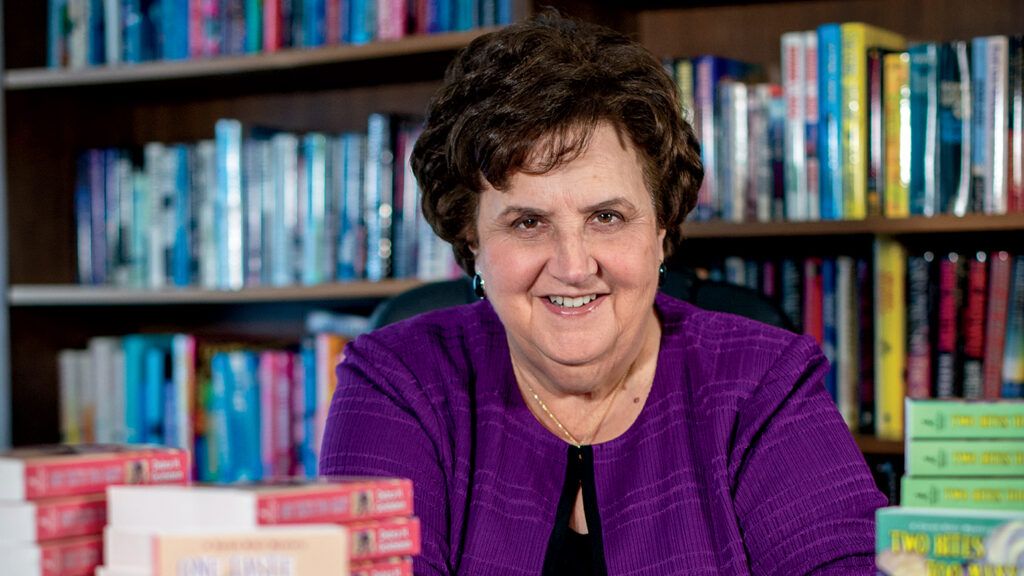I looked over my glasses from the bench and asked, “Is there anything else?” I was confident in the details of the case and ready to deliver a standard hearing closing.
“No, Your Hon—” the attorney began, but his client interrupted.
“Your Honor, I have one more thing,” the man said.
I looked to the attorney. I’d been a judge for 23 years—a female judge from a time when that was neither expected nor particularly respected. I ran a tight ship. It was always “Yes, Your Honor” or “No, Your Honor.” I made a face that said, Get your client under control. That should have been enough. But today the attorney threw his hands in the air, exasperated.
I knew we were in trouble. I turned to the client. “Yes, sir. What is it?”
“I just want you to know, no matter how you rule, I’m buying your book.”
Oh no. My insides did a somersault. I’d been trying for 10 years to keep my writing separate from my career. Scribbling mystery scenes in the wee hours of the morning as I put in full days behind the bench in black robes. For years, nobody had any inkling of what I did in my spare time, but that changed when my first book, Maze in Blue, was published in 2011, followed by a number of short stories. I was trying to sell another novel, Should Have Played Poker: a Carrie Martin and the Mah Jongg Players Mystery. Magazines and local papers were now publishing articles with titles like “Judge Writes Book” and “Judge Wrote Mysteries.” That was the marketing hook. My private passion was fast becoming common knowledge.
I kept a straight face and delivered my ruling. Then I collected my things to head home. In the car, thoughts began to swirl. If everybody knew I was a writer, would that affect my role as a judge? Was this double life no longer sustainable? Would I have to make a choice I dreaded?
I’d been torn between pleasing others and following my passion ever since I was a girl. My dad had wanted desperately for me to choose a practical career that would provide independence, something like nursing or teaching. It was my mother who encouraged my sister and me to do whatever we wanted. A Holocaust survivor, she was a scrapper who believed anything was possible with hard work and chutzpah. And of course if it was God’s will.
“I want to be a comedienne,” I told her once.
“Perfect!” she said. “You’re as funny as Carol Burnett.”
When I changed my mind and decided to become a writer, she was all for it. Still, as an oldest child, I felt an obligation to please both my parents. When I graduated from the University of Michigan with degrees in English and history, along with a teaching certification, my father was thrilled. Yet it was my mother who wished me well when I moved to New York two days after graduation to find a job in publishing and start my writing career. “Follow your dreams!” she cheered.
I ended up working for a small publishing house. I liked what I was doing, but doubts still plagued me. What if this didn’t work out? Was I disappointing my father? I started putting together law school applications at night. Law was an honorable, challenging and secure profession. A perfectly practical match for someone with my ambition. I pushed writing to the back of my mind and focused on applications. Eight months later, I picked Emory University School of Law from among my acceptances, as much for the Atlanta weather as its prestigious reputation.
Nose to the grindstone, I hardly noticed as time flew by. By 25, I was graduated and working as a labor lawyer in Birmingham, Alabama, arguing an equal pay case of first impression. By 30, I was married to the love of my life, Joel. We were raising two children from Joel’s previous marriage and, later, our own two kids—twins, a boy and a girl. I got active in my temple and served on numerous community boards. I published legal articles and lectures. Sure, I still wrote a little. A story or a skit here and there. But nothing serious.
At age 36, I was appointed as one of the youngest federal administrative law judges in the country. One of only 26 women.
I knew it was important for me to be taken seriously, especially as a woman in a male-dominated field. I didn’t fraternize. Didn’t joke. I did sometimes wear something fun underneath my black robes. Some leopard-print or frilly dresses. If I was in the courthouse where I had to cross the waiting room to use the bathroom, I often left my black robes behind. I once overheard a claimant warn another, “She may look normal in a dress, but just you wait. When she’s sitting above you in black robes, it’s like talking to God.”
For years, I lived by the letter of the law, making both my parents proud. I was a judge with a heavy caseload, and my father was happy knowing I was chair of my temple’s education committee. Not exactly a teacher but close! My mother loved our blended family, my work as a Girl Scout leader, my volunteer activities and how I centered God in my life through my temple commitments. I was proud of myself too, but I wasn’t writing much except briefs and legal articles. I couldn’t help but feel as if something was missing.
On top of everything, I often kept late hours with my youngest son, Stephen, who hated going to sleep. I wistfully said one evening how I missed having more time. Especially time to write.
Nine-year-old Stephen looked up and said, “Why don’t you just do it?”
I was taken aback. Why not do it? Because of my job. Because of my family. Because of my other commitments. But how could I explain that to a child? “Because…” I paused. “You never go to bed.”
When bedtime came, Stephen went right into his room and turned off the light. No muss, no fuss. With the night unexpectedly empty, I did what lots of working moms would have done. I watched a movie, painted my nails, read a magazine. In the morning, Stephen walked into the kitchen. “Well,” he asked, “did you finish?”
I felt like an idiot. Here I was preaching to my daughter’s Girl Scout troop to “reach for the sky” and “follow your dreams.” And what was I doing?
It would take almost 12 years of guilt and false starts before I finally sat down to write something significant. A friend lent me her beach condo for the weekend to give me time and space to do it. But what kind of story could I write? What did I have to say? I’d spent so much time pleasing others that I wasn’t totally sure who I was. I sat at a desk and started thinking about what I knew well enough to craft into a story.
University of Michigan in the seventies. I started scribbling in longhand on a legal pad. By the end of the weekend, I had 85 pages. I kept writing, filling more legal pads, and five of those original pages went on to become my first book, a whodunit called Maze in Blue. I’d become a mystery author at age 56. My mother was thrilled.
My next novel, Should Have Played Poker, tumbled out. I loved writing mysteries and for years thought I wouldn’t have to choose between keeping my respectable job and following my passion. But the man in the courtroom calling me out from behind the bench now had me thinking differently. I needed to have a talk with my husband about the future of my career and our life.
“Joel,” I said as I walked in the door at home, “we need to run some numbers.”
Was it time to choose? Joel and I looked at our finances. We had already put our kids through school. We were in good financial shape. We could— was it possible?—make things work. That is, if I wanted to. Joel went to bed, and I stayed up praying. God, do I give up my career? What is your will for me? I’d sold a book and 13 short stories, but there was no promise of future success in writing. As I prayed, I relaxed and opened myself to divine direction. The knot in my stomach went away. I felt suddenly at peace.
The next morning, I walked into the office and announced that I wanted no more cases assigned to me. “I’ll work out my docket,” I promised. I reckoned it would take another six or seven months to get through all the cases. But afterward I would be free to follow my passion. The other judges looked shocked. An administrative judgeship was a lifetime appointment.
“Are you sick?” one of the judges asked.
Another took me aside. “What are you going to do every day?”
I smiled. “Have a life.”
It’s been more than six years since I left my judgeship, and I’ve never looked back. I’ve published two more books: One Taste Too Many and Two Bites Too Many, the first books in Kensington’s Sarah Blair mystery series. My life as a writer isn’t exactly what I expected. I’m a little disorganized, and I never write as fast as I’d like. But I love working out a mystery. Have you heard the one about how the judge leaves her day job and lets her dream and God guide her? Took me long enough to figure it out.
For more inspiring stories, subscribe to Guideposts magazine.






